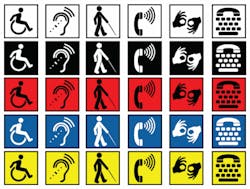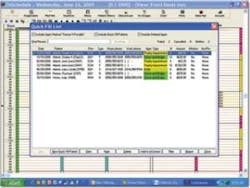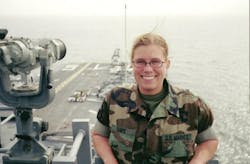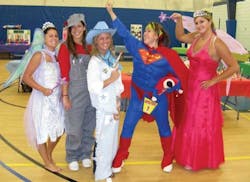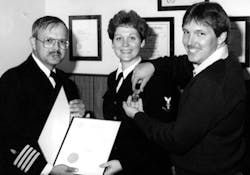by Cathy Hester Seckman, RDH
When you look at your life and your career, there are always roads not taken. One of the roads I should have taken was to military service. So I was particularly interested, this past summer at UOR, when a friend casually mentioned she had spent four years in the Navy.
“That sounds like a story to me,” I said. “Can I call you?” With the help of friends, I located eight dental hygienists who are veterans of the U.S. Armed Forces. Here are their stories.
Beverly Bizzell, RDH, BS
Beverly Bizzell of Southern Pines, N.C., is a 30-year veteran of the North Carolina National Guard. The Guard, she explains, is the oldest component of U.S. Armed Forces, tracing its history back 375 years. Today’s National Guard is the direct descendent of the militias of the 13 original English colonies. There are two divisions: Army National Guard and Air National Guard. The Guard is the only military branch with a dual mission. As a state entity, the Guard can be called up by the governor for domestic issues such as natural disasters, civil unrest, and border problems. Under federal direction, they can be deployed overseas. Traditional Guardsmen, like Beverly, are considered part-time Guardsmen, but are still subject to be called to full-time duty. Other Guardsmen work full-time for the Guard.
Back in 1976, Beverly remembers that she was not looking to get into the military. She had recently graduated with a bachelor’s degree in dental hygiene from the University of North Carolina Chapel Hill, and was working in public health. She told a fellow hygienist that she was thinking of getting a part-time job.
“She suggested I go into the Army Reserves, but I was clueless. I thought you had to have served on active duty first, but that’s not what it was about. My supervisor was a dentist in the Army Reserves, and he was very supportive of the idea. I enlisted in July 1978, knowing that as a state employee I would have a generous military leave policy for reserve service.”
Beverly trained at Ft. McClellan, then worked in a dental unit at Ft. Bragg for a year.
“I had a friend, a nurse, who was thinking of joining the National Guard, so I said, ‘If you’re going to do that, I’ll go with you.’ So I transferred to an N.C. National Guard medical unit and stayed 29 years.”
Her basic obligation to the Guard was to work one weekend a month, plus 15 additional days per year. However, over the span of her career there were additional requirements and opportunities.
“As part of my career development, I attended an Officer Basic Course in Texas for 13 weeks. I spent more than six weeks in training overseas in Italy and Germany.”
The unit supported a combat brigade of some 4,000 people. She worked as a hygienist, but was also trained and qualified as a combat medic.
“In civilian life, I had already been trained as an EMT. I stayed in the medical company for almost 11 years. After I was commissioned as a Medical Service Corps officer, I performed different duties and didn’t work as a hygienist. It was a nice break from my civilian life.”
The wonderful things about the military, Beverly believes, are the opportunities available. With the tuition assistance program, she was able to earn a master’s degree in counseling education. When she retired from the Guard three years ago, it was at the rank of lieutenant colonel. She’ll begin to draw a military pension at age 60. Her retirement check will include additional money that the State of North Carolina provides as a benefit to Guardsmen with more than 20 years of service.
“I would absolutely recommend military service to anyone today. I’ve gone to high schools in uniform to present career programs. The military offers a great start in life to kids who come out of high school seeking some direction for their lives. You’ll never find a better deal. The military trains you, pays you, feeds, clothes, and houses you. It gives you health care, travel benefits, and for myself as a reservist, an additional retirement check. I encouraged my niece to join the military because of the GI bill, and now she’s going to nursing school. She put in $1,200 of her own money, and will receive more than $40,000 worth of educational benefits from the military. You can’t beat that.
“The people I worked with in the Guard were like my family. I wouldn’t trade anything for the experience; it added so much to my life, but 30 years is a long time, and I finally decided it was time for me to take a rest and have more time for myself and my family.”
Her husband, Chuck, is also retired from active duty with the National Guard.
Today, Beverly is still employed as a public health dental hygienist with the state of North Carolina, a position she has held for the past 35 years. Part of her time is spent placing sealants at schools; however, most of her focus is on providing preventive services.
“We go out to schools and conduct calibrated assessments, part of which involves the collection of data. I provide a lot of classroom education and work on community projects. Over the years I’ve done many workshops and educational programs with parents, teachers, nursing home staff, and day care staff. Our goal is to assist children and their families to find available resources, and to help get them into private offices for care.”
Al Case, RDH
Hygienist Al Case followed a family tradition when he joined the Navy in 1969, going to boot camp and dental technician school in San Diego. He had thought of being a medical corpsman, “but they were having targets painted on their helmets and being sent to Vietnam.” He worked on recruits at the Great Lakes Training Center in Chicago. Primarily, he was trained as an assistant, but eventually did initial exams, cleanings, and X-rays. He stayed there two-and-a-half years, then was assigned to the dental clinic on the destroyer tender USS Yellowstone at Cooper River, S.C., where he performed all of the prophies.
“There weren’t many ships that had dental clinics, so we took care of crews from other ships as they rotated in and out of Vietnam.”
Al enjoyed working with Navy dentists, who were mostly trying to pay off their school loans with a stint in the service.
“It wasn’t a strict military situation. It was actually a little bit MASH-like.”
He loved his time in the Navy, but admits the early 1970s weren’t the best time to be enlisted.
“With short hair, we stuck out like sore thumbs wherever we went. To many of our civilian peers, the military wasn’t looked on as being honorable during the Vietnam era. We were ostracized to a certain degree.”
He left the Navy in 1973 to enter the dental hygiene program at the University of South Dakota. Though he was male, older, and already a veteran, he didn’t feel out of place.
“School was enjoyable. I had my basic requirements out of the way, so my only courses were in dental hygiene. The students often used me as a resource because of my experience, and because I was as old as some of the instructors. There was a guy in the class a year ahead of me (another Navy dental technician), and one in the year behind me. We were the first men to go through the USD hygiene program.”
After graduation in 1975, Al moved to Coos Bay, Ore., to work in private practice, then spent three years in Rapid City, S.D., and then Watertown, S.D., for another three years. In 1983, he helped a friend open a practice in Minneapolis, and moved to his current practice in St. Paul in 1990.
“I’ll be here ’til I retire. I have a 12-year-old daughter, Taylor, so retirement isn’t anywhere near. I work three-and-a-half days a week, have long weekends, and I don’t feel overworked. It’s a pretty comfortable situation.”
The military, Al feels, gave him a vocation.
“I don’t see my daughter going into the service, but if she did, I’d be supportive. It’s an honorable thing to do.”
Jill Childs, RDH
When Jill Childs entered the Air Force after high school in Illinois, she was looking for a new life and a way to pay for college. She spent most of her enlistment at Grand Forks Air Force Base, N.D., in addition to a four-month deployment to Aviano, Italy. She worked as a cook and a fitness center specialist.
During her enlistment she met her husband, Scott, also an airman, and both served four years, until 2002.
“I knew I could do more than be a cook, so when I got out of the Air Force, I used the GI Bill and an Illinois veterans’ grant to start working on a photography major at Southern Illinois University. I got a part-time job as a circulating assistant in a dental office, because I was also interested in dentistry.”
People at her office suggested she go to dental assisting school, then hygiene school. She completed a degree in dental hygiene at John A. Logan Community College in Carterville, Ill.
Jill and her husband, Scott, who had reenlisted as a member of the Air National Guard, moved to Smyrna, Tenn., shortly after she graduated. Their children are Brooke, 5, and Aaron, 2. For the past four years, Jill has worked two days a week in the dental office of Marciniak, Edge, and Ryu in Smyrna, but is looking for more hours.
“I’m really proud of being a veteran,” she says. “It was something great that I could do for my country and for myself. I got an education, and it made me a more responsible person. I have a better work ethic because of the Air Force. I’m used to being on time and making sure the job gets done. Military service instilled a sense of pride in me. If my children decide to go that route, I’ll support them. Of course, I’ll want them to choose the Air Force.”
Nadine Ishmon, RDH, BSDH
As a child, hygienist Nadine Ishmon of Nashville, Tenn., remembers going to work occasionally with her mother, an oral surgery assistant. The experience made her think she might want to become a dentist. After high school in 1984, she started down that path by enrolling in a dental assisting program at the Bryman School in Atlanta, Ga. In 1987, she joined the U.S. Army Reserves and was attached to the 3299th Dental Service Detachment in Chamblee, Ga.
“I didn’t know anything about the military,” she recalls. “I was just a kid looking for college money.”
Soon after, she was also hired by the U.S. Postal Service as a flat sorter operator.
“During our basic training at Ft. Dix, N.J., we learned to handle weapons, learned the Army chain of command, and worked on physical training. A soldier starts out as an E1, but I came in at E3 because of having been in college.”
After eight weeks of basic training, she went to Advanced Individual Training and graduated as a 91 Echo (dental assistant).
While Nadine worked full-time for the postal service and took classes at Georgia State University to prepare for dental school, she also participated in Army Reserve activities. She worked at Ft. McPherson, Ga., one weekend a month, and at Ft. Benning, Ga., for two weeks every year. In the summer of 1990, she joined other members of her dental unit at Ft. Benning for PLDC (Primary Leadership Development Course). On Aug. 28, a fellow soldier read in a newspaper that Unit 3299 had been called to active duty in Operation Desert Storm.
“They let us finish the training, then we went home to get our lives in order. We had to make a will and inform our employers that we would be on active duty for at least 90 days. Those with children had to assign a legal guardian for them and sign a power of attorney. Then we had physicals. It was just a matter of days. By Sept. 2, I was in Ft. Bragg. Some of the dentists in our unit went to Kuwait, but most of us were sent to backfield areas to replace active duty Army units that had been sent overseas. I was at Ft. Bragg until June of ’91 before being relieved.”
At that point, Nadine picked up her life again and returned to college and the post office.
While on active duty during Desert Storm, Nadine met her future husband, Richard, at Ft. Bragg.
The couple married in 1994, and Richard was then assigned to Fort Hood in Killeen, Texas. Nadine left the Army Reserve after her commitment ended in 1995. She worked as a dental assistant from 1995 through 1999. After Richard graduated from drill sergeant school, they were assigned to Fort Sam Houston in San Antonio, Texas. There he served as a drill sergeant and 91 Echo (dental assistant) instructor from 1999 to 2003, when he retired after 20 years.
“He had been a hygienist in the Army, but chose not to pursue that in civilian life, so now he works for the post office. It’s funny how we’ve flipped careers. He has years of hygiene stories, though, and we share that in common.”
In the meantime, Nadine entered dental hygiene school at the University of Texas Health Science Center and graduated with a bachelor’s degree in dental hygiene in 2004. She never did get to dental school.
“I knew how military service affected the dentists with whom I worked. And I realized how difficult it would be to pursue dental school with all the changing of duty stations.
When she finally latched onto dental hygiene, Nadine says, “I never let go. I truly enjoyed it. I’m just about to start a master’s degree program in dental hygiene through the University of Tennessee. I love hygiene; it’s more fulfilling than I would ever have thought. I love it to death.” Every now and then she still considers dental school, “but all I can think now is that I’m really happy. I don’t need to fix what isn’t broken.”
Because her most recent job was in a periodontal office that was a perio rotation site for Tennessee State University hygiene students, Nadine has discovered that she loves teaching. Her next step, she believes, might be as a clinical instructor.
“We are still a military family,” she says. “Just a retired one now. Our oldest, Adrienne, 19, is entering an Air Force ROTC program at the University of Memphis, and majoring in computer engineering technology. We knew from our history how to put her on a better path.” They also have a daughter, Amber, 16, and a son, Richard III (Trey), 11.
Leslie Kidd, RDH
Leslie Kidd was bored working as a secretary in Frankfort, Ky., after high school, “so I decided to join the Navy to get out and see the world.”
It was an easy choice for her, since her father had been in the Navy. She did her basic training in Orlando in 1974, then went to San Diego for dental technician school. Her duty stations were anything but boring — Roosevelt Roads, Puerto Rico, for 18 months, then Orlando, Fla., for three years. After her five-year enlistment, she also spent five years in the Navy Reserves.
“For the last year-and-a-half of my enlistment, I performed hygiene duties, and that made me really interested in hygiene as a career. I was absolutely satisfied with the Navy and wanted to stay in, but I also wanted to be a hygienist, and I couldn’t do both.”
With the help of the GI Bill, she went to Lexington Technical Institute, which is affiliated with the University of Kentucky, and earned an associate’s degree in 1981. Finding a job near Lexington and Louisville was tough, so she did secretarial work for the next two years. Finally, a friend found her a job in Hopkinsville, Ky.
“I worked for two dentists there for three years. The pay wasn’t the best, so I talked to another friend who worked at Ft. Campbell, Ky. I applied there and got a civilian job with the U.S. Army.”
Reentering military life, Leslie had to switch gears and learn the different ranks and uniforms of the Army, but the job has been great.
“I’ve been there since ’86, and I love it. I work in the perio department, and I feel like I’m contributing by helping the soldiers there.”
She is also a basic life support instructor for the military.
Leslie is divorced and has two children, Kristopher, 27, and Nicholas, 22. Her favorite hobby is making beaded jewelry.
Deanna Otts, RDH, BS
Combat veteran Deanna Otts of Ft. Worth, Texas, enlisted in the Marine Corps more than a year before 9/11, so she had no thoughts of going to war — she just wanted a college education.
“Sadly, my father died when I was 15, and my mom couldn’t send me to college. I didn’t have the academics to go, so I chose the military as a stepping-stone to a degree.” She actually transferred to a different high school in her hometown to take advantage of a Junior ROTC program. She graduated in 2000 and left for boot camp three weeks later.
At Camp Pendleton near San Diego, she was trained as a truck driver.
“In the Marines there are not a lot of jobs for females that aren’t desk jobs, so based on my aptitude scores, I looked at whatever outside work was available, and became a truck driver.”
Her unit was on a training mission outside the base on Sept. 11, 2001.
“We knew then that at some point, we would go to war. My turn wasn’t until 2003.”
Deanna was support personnel for a combat unit that was war-ready all the time. In 2003, the unit began a tour of duty aboard the USS Pelileu, an LHA (light helo assault) ship with 2,500 personnel. They lived aboard for most of the next nine months.
“Twenty-four/seven, three sixty-five,” she explains, “there’s a U.S. naval ship with a unit of Marines in every ocean in the world. I happened to be one of those Marines at that time.”
The ship made stops at different ports all over southeast Asia, the Persian Gulf, and Australia. Sometimes they trained off the ship, but since there was usually nowhere for Deanna to drive, she and her fellow truck drivers were assigned different duties that included helping the cooks, working trash detail, and running the onboard gymnasium.
“Mostly,” she says, “I slept, ate, and worked out.”
Late in 2003, the ship made landfall in Iraq and spent several weeks in-country.
“My duty was as a machine gun leader. I had guns on my truck, and was in charge of two Marines. We carried supplies, food, water, ammunition, anything the outside troops needed. We drove from support areas to the units in camps, and dropped off whatever they needed.”
One mission she’ll never forget was to an abandoned power company facility.
“It was a tall building, maybe five or six stories, on the Tigris River. Iranians across the river started shooting at us as we were delivering supplies. We got into a skirmish and exchanged gunfire. We were there longer than the mission called for, but everyone got out safe. No one was injured. I didn’t actually have to fire my M-16.”
A more pleasant mission for her unit was bringing a non-working hospital back into operation.
“We brought in water and supplies, and were able to provide medical attention to both troops and local people in a town called Al Faw. We rebuilt the school there, and brought much-needed supplies to the townspeople.”
Back at home, her family was terrified.
“I could never tell them where I was, only where I had been, so they never knew. They didn’t know I’d been in Iraq until I was back on the ship. In the end, though, they were extremely proud of me. My mother still has the bumper sticker, the T-shirts, everything.”
Combat duty, she says, “was absolutely a bonding experience. I’m still in touch with many of the people I served with.”
Though she isn’t sure how she feels about the U.S. position on Iraq, she believes in her own involvement.
“I feel mostly good about my personal position and what I did. I focused on the here and now, and the people around me, and did what I needed to do. I believe I did a good thing, and I’m very, very proud of it.”
When she was off the ship and her four-year commitment was ending, Deanna decided to move on. “I really wanted a college education, and while I was on active duty it was nearly impossible, though I did take some classes before 9/11. I decided to get out altogether and do something else in my life.”
Back in Texas, she enrolled in Texas Women’s University as a sophomore.
“I looked at the programs available, and dental hygiene was one of them. I knew it would be a rewarding and lucrative career, and I’ve always been appreciative of good dental care. People have told me I have a beautiful smile. The program was difficult to get into, but I made the grades and got in on my first try.”
She graduated with a bachelor’s degree in dental hygiene in 2009, and now works as a clinic hygienist at the Brenham State School for the Disabled.
“It’s a fantastic job with awesome benefits,” she says, “and I love it. I was bored in general practice, so this is great for me.”
Jamie Sidsworth, RDH
It seems like an unlikely transition from jet engine mechanic to cable splicer to dental hygienist, but that’s what Jamie Sidsworth of Knoxille, Tenn., has done with her life so far. When she joined the Air Force at age 19, looking for college money, a recruiter matched available openings with Jamie’s test scores and sent her to learn jet engine mechanics.
“It was easy,” she remembers, “not challenging. It was actually kind of boring to sit around waiting for something to break.”
In four years of active duty she got overseas only once, to France. After she left active duty, she went into the Air Force Reserves for seven years and earned a degree in dental hygiene from Chattanooga State at the same time.
“It was great being a veteran in college. You know how there’s always one mean teacher? She would just pat me on the back and walk away — you know, ‘Thanks for your service.’”
As a reservist, Jamie worked as a cable splicer for the first four years, then as a dental tech.
“I spent time in Germany and Saudi Arabia. I also got to Hawaii.”
Jamie’s husband, Jason, is an Air Force generator mechanic for aircraft, and was deployed to Spain this summer. The couple have two children, Hallie, 6, and Olivia (Livey), 7 months. The girls are the reason Jamie finally left the Reserves.
“I was hesitant to do that because I had so many years in, but I worried about being deployed and having to leave the kids behind. If my husband hadn’t been in the military, I could have taken a deployment and he would have been at home. One of my patients told me he’d given up 20 or 30 years of weekends and ballgames with his children, and if he had it to do over, he’d choose his kids any day.”
Besides the problem of having young children, Jamie did not want to remain as an Air Force dental tech once she had her hygiene degree.
“I would see active duty people working as hygienists after a nine-week course, and realize how much more I’d learned in college. I would have been glad to go back to mechanics instead.”
She is, as she says, “in babyland right now.” She homeschools Hallie in a cooperative setup, which allows her to still work three days a week as a hygienist. She recently participated in a mission trip to Lima, Peru, with fellow church members, and hopes to go to Ghana, Africa, for another mission trip soon.
Jamie believes serving in the Air Force was a good decision for her, but she would choose a different route for her children.
Angie Stone, RDH, BS
“I always thought,” says Angie Stone of Edgerton, Wisc., “that I’d like to be in the Navy, and I always thought I’d be a hygienist.”
In 1980, while still in high school, Angie was discouraged by her teachers and peers. “‘Oh, you’re too smart to go in the Navy,’ they said. ‘It’s no place for a girl.’”
Instead, she was convinced to enroll at Marquette University in a four-year dental hygiene program, but after the first semester she said to herself, “I don’t like it here. This is not where I belong.” Joining the Navy still appealed to her.
“There’s something about it, I don’t know. I’m from a small town, and I felt like there was something more I could be doing. I felt like the Navy was a way for me not to be stuck. So I went to the recruiter in Milwaukee and enlisted in the Navy. When my mother called to say she was coming to pick me up for Christmas break, I said, ‘Bring the truck. I’m not coming back here.’”
She went to Orlando, Fla., the following November for basic training.
“It was terrible, I hated it. I don’t like to be yelled at. We arrived at the base on a bus in the middle of the night. As the gate opened and the bus went through, I could see a fence with barbed wire on top through my reflection in the window, then I heard the gate slam. These women flew onto the bus and started screaming at us, and all I could think was, what the heck had I gotten myself into?”
After basic training Angie spent eight weeks at the Naval School of Dental Assisting and Technology, where she was a student of the month. She graduated with the rating of Dental Technician (DT). For her first duty station, her dream list included an overseas assignment, then shipboard, then the West Coast. What she actually got was a posting to Patuxent River, Md.
“So much for a dream list,” she thought.
But there was a different kind of dream in Maryland. She met Jay, her husband, at the Patuxent River Dental Clinic when he came in for an appointment. At the duty station, she performed hygiene procedures after on-the-job training as a DT3(E-4). She developed a sealant program for dependent children and received a fair amount of recognition for that and other activities. As an E4, she was honored with a Navy Good Conduct Medal. Angie later transferred to Great Lakes Naval Station in Waukegan, Ill., to be close to her parents when she and Jay decided to start a family. She was then a DT2 (E-5) and held an administrative position, submitting dental production reports to Washington, D.C.
“I’m very proud of my military service,” she says now. “It was a big honor to have been able to serve. Although I didn’t go to the front lines, I had a role. All of us behind the scenes were the ones making our people deployable. We knew our pilots and sailors needed to be able to leave at a moment’s notice, and our role was to keep them dentally ready. I’ve always been proud to be able to say, ‘Yeah, I did my part.’”
Following five years of active duty, Angie and Jay returned to Wisconsin, where she served a year on inactive reserve and worked as a dental assistant. They started a family. Now, Ashley, 21, is in Army ROTC at the University of Wisconsin, Madison, and will serve as an Army officer. Spencer is 16 and thinking of ROTC or becoming a chef. Maybe, Angie says, he’ll do both.
After seven years of assisting in civilian offices, Angie entered a dental hygiene associate’s degree program at Madison Area Technical College in 1995. She worked for a while as a hygienist, then returned to school for a bachelor’s degree in psychology.
“I had hand and brain skills as a hygienist, but I needed to understand how my patients’ brains worked. Psychology and hygiene are an amazing combination. They make a whole that fits really well together, and I understand so much more about why my patients do the things they do.”
This past January, Angie retired from clinical hygiene to pursue other opportunities. She is the lead product educator for Xlear Inc. and its Bridging the Gap program, which educates hygienists about the oral benefits of xylitol and where they can obtain quality products. She also trains hygienists and dentists in using the Florida Probe, a computer-integrated periodontal charting system, for the Florida Probe Corporation. She occasionally assists American Eagle Instruments with special projects and trade show booths. She is a five-time attendee of CareerFusion. She also has her own company, HyLife, LLC, through which she speaks on several hygiene-related topics. She has authored numerous articles. During her career, dental hygiene has taken her to 27 states and three countries to educate dental hygiene colleagues.
Unlike the years when Al Case served during an unpopular war, we Americans have learned to appreciate and honor our servicemen and -women. We thank them when we can, and support them when we should. At www.joiningforces.gov, anyone can send thank-you messages to military service members and offer assistance. At http://createthegood.org/toolkit/help-military-families?promo=front, you can learn ways to offer assistance to local military families.
Cathy Hester Seckman, RDH, has written on dental topics for 26 years. She speaks on pediatric issues, and works clinically in a pediatric practice. She is also an indexer and a novelist.
Past RDH Issues


